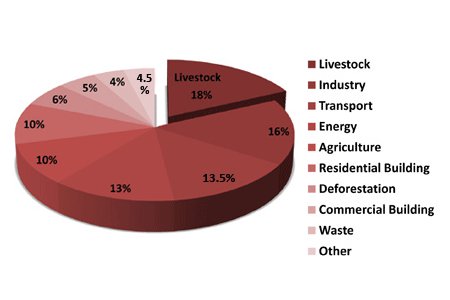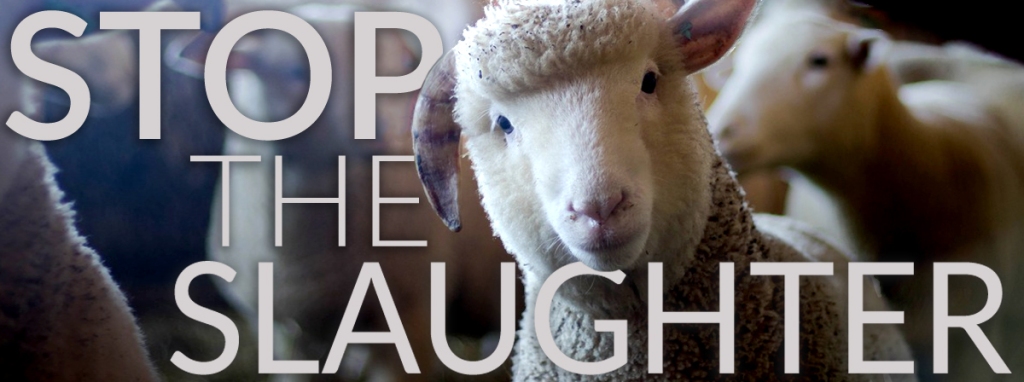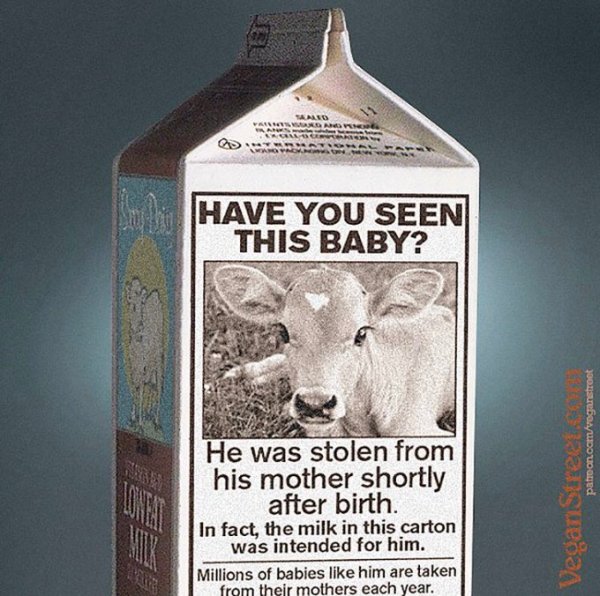The world’s most important pie chart
Letter to Science for Peace …
By Paul York
Cruelty-Free.org
It was earlier noted on this list that if factory farms account for 18%, then 82% percent of the global GHGs do not come from them. But please take note that livestock / factory farms, at 18%, are in fact the # 1 source of GHGs in the world, out of nine categories of sources! They therefore warrant more attention by climate change activists than has hitherto occurred.
1. Livestock = 18%
2. Industry = 15%
3. Transport = 13.5%
4. Energy = 13% Note: this is issue which ENGOs give most attention.
5. Residential buildings = 10%
6. Deforestation = 10%
7. Commercial buildings = 6%
8. Waste = 4%
9. Other = 4.5%
Source: the “Livestock’s Long Shadow” UN report on global emissions, referred to earlier: http://www.fao.org/docrep/010/a0701e/a0701e00.HTM
Moreover, not all GHGs are equal. Most of the methane in the total comes from the first source, and this is many times more potent than CO2 – which is perhaps why livestock ranks first.
So here is my critical question: how can ENGOs (eg. Greenpeace, Sierra Club, WWF, Pembina, etc) focus almost entirely on replacing fossil fuels with renewables when it accounts for just 13% or 4th place on the chart?
Or another way of putting it: how can they pay so little attention to factory farming, the single largest sources of GHGs out of 9 categories? I find this astounding, though not inexplicable, if we look at the hesitance of even many environmentalists to change their diets.
Given that we have a choice in diet, it could be argued that choice can be considered the most important moral choice facing us as a species at this time in history.
Let’s look at the obstacles and solutions to the issue raised by the chart, briefly.
With livestock, the issue is diet preference and the political power of the Big Meat industries; and the solution is a reduction or elimination of animal products from diet and a turn to plant-based diets.
This, I should note, is very similar to the tobacco industry, where human beings have a choice, and Big Tobacco blocked efforts to expose its evils for a long time, then governments stepped in and new policies came into effect.
With industry, the obstacles are (apparently) loss of jobs and the reticence of big industries to change what they’re doing; and the solution is green jobs and mandatory environmental regulations, and in some cases just shutting down the most egregious industries.
With transportation, the obstacle is loss of convenience in driving and flying and the power of auto makers and fossil fuel companies; and the solution is more public transportation, more bicycles, more trains, and longer travel times for all of us.
Or just cutting back on travel, as before the fossil fuel age. With all the communication technology (eg videoconfereincing) we have now, I fail to see why this should be such a problem for people.
Transportation is very similar to diet, I should add, because these are two areas where the role of individual is very important, and less blame can be placed on big corporations.
With energy, the obstacle lies with the hegemony of fossil fuel companies, as well as overuse of cheap energy by consumer and industry; and the solutions are strictly enforced energy conservation measures, and much more renewable energy infrastructure built, to replace fossil fuels and nuclear.
With residential and commercial buildings, the problem is loss of energy from poor design and the resistance of the building industry to change this, and hesitance of building owners to retrofit, due to cost; the solution is green architecture and retrofits and energy conservation, and changing building codes, and government investment and incentives for retrofits.
With deforestation, the obstacles to change include the power and influence of the logging companies, and the high demand for wood and paper products, and solutions include material recycling, mandatory conservation legislation, and more more sustainable replacements for wood and paper.
As with mining, and oil, logging is an extraction industry and legislation needs to be passed to eliminate them.
With waste, there ought to be a tax on producers of materials that become waste products, such as stronger legislation to reduce packaging, as in Europe, and also a scaling back of the consumer culture itself, i.e. less purchasing of unneeded items, and more emphasis on the 3Rs and a sea-change in the way products are produced: more cradle-to-cradle use of items and fewer disposables.
Of course this is all very much simplified. The problems and solutions are infinitely more complex, but my main point is that in all of these cases, a change in attitude and priorities is required, and a willingness of individuals to relinquish their self-interest for the collective good. But as not everyone will do so willingly, legislation is required – which means that civil society groups such as SfP play an important role in lobbying for change – change which one hopes eventually leads to these kinds of laws.
The first step, in my view, is to demand the closure of factory farms, the largest culprit on the chart. And all extraction industries – mining, logging, oil, and gas – as well. Our civilization does not need these things to survive, or even thrive. We can have a healthy, sustainable no-growth economy without them.
In fact, the survival of this civilization depends on doing away with them, once and for all. They cannot be reformed. With diet we have a choice, and with extraction materials, we can recycle the ones we already extracted. Green jobs can be created from the vacuum that these industries leave.
Science for Peace receives no government or corporate funding (that I know of) and is not beholden to any outside interests. Therefore, it is entirely possible for SfP, should its members wish, to loudly call for an end to these vile industries, for the sake of the survival of human civilization and the for the sake of the 80% of species predicted to become extinct by 2100, due to climate change.
No ENGOs that I know of has ever called for an end to factory farms or extraction industries en masse and in toto (though I hope I am mistaken in this). I think it is time civil society organizations, such as SfP, with nothing to lose, to start taking a strong stand against these industries.
This may meet with some resistance from the public and pundits, but given what’s at stake – the survival of everyone, now and into the far future – I believe it is a moral imperative of the first magnitude to speak boldly on these matters, and not mince words any further.
Please share this image with others.
Important responses to this article. I have removed names to protect privacy.
1st reponse:
Not to claim that livestock aren’t important, but your “critical question: how can ENGOs (eg. Greenpeace, Sierra Club, WWF, Pembina, etc) focus almost entirely on replacing fossil fuels with renewables when it accounts for just 13…% or 4th place on the chart?” has a simple answer:
because most of the emissions in industry, residential buildings, commercial buildings and transportation also come from fossil fuels. So NGOs don’t want to replace only the “energy” sector (which is rather ambiguous as to what it includes, since all the end uses are in other categories) fossil fuels with renewables, they want to replace all fossil fuels.
My response to the 1st response:
That’s a good point. Factory farming is also reliant on fossil fuels too for the grain production and livestock transportation, I believe, so that underscores your point. However, what I have noticed – and part of why I asked that question – is that ENGOs are shy about touching the issue of factory farms. I think because it is a sensitive issue with many of their constituents and they have play politics a bit, to stay funded.
I wrote to 350.org about this recently, for example, and the reply was that diet is an individual choice and that they encouraged community farming. This is a far cry from calling for the end of factory farms, on which they have no policy, I believe.
The same critique can also be made of them visi-a-vis certain types of transportation. I have not noticed a great deal of attention paid by them to the issue of elimination flying for example. Monbiot wrote about flying in Heat, and there are transportation activists around, and the odd policy paper, but no serious campaigns by the major ENGOs on it, as there is around renewables.
The ENGOs seem to be avoiding these two issues that are critical because the public is very attached to the status quo in diet and transportation (meat and SUVs and frequent flying). I would like to see the ENGOs overcome this hesitation and come out openly against factory farms and for veg diets, as the chair of the IPCC has done.
2nd response:
One thing that might be helpful is a more specific accounting of the factory farming industry. What I’m getting at here is that activists opposing a given coal plant can point to it and say — this plant produces XXXXXX tonnes of cO2 equivalent every year. No such numbers exist, to my knowledge, for factory farms.
The largest players should obviously be targeted. Mom and pop operations need to be seen as allies who have been co-opted and systematically disempowered. I think the zealous nature of the AR movement could be an obstacle here. The reality is that most farmers can barely pay their bills and would benefit from a return to a diverse local/community oriented production, instead of monocropping for export. We won’t win if we paint all producers with the same brush. We need to be willing to compromise, collaborate, and get some good research published.
Moreover, the ‘viable alternative’ is unlikely to be widespread vegetarianism on this one. Rather, (a return to) permaculture, major emphasis on rebuilding local economies, urban agriculture etc seem to be the promising solutions. Again, the AR movement may be an obstacle here. See Lierre Kieth’s “The Vegetarian Myth” for a critique of meat-eating’s climate change implications. As a gross oversimplification, grain-feeding is the major problem here, not meat-eating per se. Good reading.
My response to the 2nd response:
Your thoughts on this, while appreciated, are very typically anthropocentric, and lacking a biocentric or compassionate perspective.
If the end goal is only about maintaining the power and privilege of our species over non-human nature and non-human animals, and to seek solutions that still allow for the exploitation of living feeling sentient beings, this is exactly what ethicist Tom Regan call “environmental fascism.”
That appears to be a problem with many in ENGOs as well: the acculturated prejudice that comes with power, and which is common in our society, but can be shown to be morally wrong.
Since there is no rational justification for this privilege that can stand the test of reason, given the overwhelming evidence of the behavioral scientists that farm animals are intelligent and sentient and have rich emotional lives, speciesism must therefore be considered the moral equivalent of racism.
Continuing to exploit animals, even at a local level, is a problem for humans too because the psychic numbing that comes from holding ourselves above other animals perpetuates the propensity in humans to murder one another.
That is why the animal rights philosophy – which calls for a more compassionate world – actually represents a viable solution to the climate crisis, if you understand that the climate crisis is caused not by lack of solutions to the problem, but lack of compassion, lack of concern for others. Many in this generation care not for the future generations and are serve themselves first, at the expense of those in the future. Therein lies the problem. The solution is compassion, altruism.
Caring more for our fellow Earthlings – getting outside ourselves – will help us overcome the single greatest barrier to progress on climate change: our difference to the fate of others (developing world, future generations, endangered species). Humans tend to bracket off and exclude other humans and other animals as expendable.
Environmental fascism and climate injustice go together: as long as men kill animals they will kill one another. If we are brutes towards cows, we are more likely to be brutes to each other. Animal cruelty and dehumanization go hand in hand. Kant made this point three centuries ago, and it is still true. See Charles Patterson’s “The Eternal Treblinka” which shows the historical and psychological link between the Holocaust and factory farms.
Environmentalism that accepts the slavery and murder of other sentient beings as permissible lacks compassion. It is morally lacking. We need to enlarge our compassion footprints while at the same time reducing our carbon footprints (behavioral scientist Marc Bekoff).
As for the charge of extremism: is it extremism to say that slavery or murder is morally wrong? Black people were enslaved in the U.S. prior to the civil war. Abolitionists opposed it then. They were called extremists for doing so. Today’s abolitionists, for animals, oppose their slavery on the same moral grounds and they are called extremists.
When Rachel Carson was active, environmentalists were call extremists (and still are by some). This is because “All great movements, it is written, go through three stages: ridicule, discussion, adoption.” (Tom Regan)
Animal rights activists feel it is wrong to exploit another sentient feeling being, and cannot understand how someone can say he or she “cares” for the environment but does not care for the sentient beings who are part of it. This seems morally inconsistent, and certainly insensitive and self-serving. Especially when there is a lot of scientific evidence to back up the fact that farm animals are very worth of our consideration:
“They (farm animals) are far more aware and intelligent than we ever imagined and, despite having been bred as domestic slaves, they are individual beings in their own right. As such, they deserve our respect. And our help.” (Dr. Jane Goodall)
Any solution to the climate crisis which does not take them into account is as unjust as the solutions proposed by technophiles, which sacrifice local populations and ecosystems – such as biofuels, nuclear energy, geo-engineering, carbon sequestration, and so on.
It would be the moral equivalent of white supremacists taking over the Earth because “to animals all men are Nazis” (Isaac Bashevis Singer). I don’t think a human society that acts in such a depraved manner is that one that I want to be a part of.
I am shocked and disappointed that some environmentalists think this way, which actually goes against a well-documented historical connection of animal rights and environmentalism.
The perspective which views either humans or non-human mammals and birds (individual whom Regan calls “subjects of a life”) as expendable is wrong.
The world must not only be sustainable, it must also be just. As long as some beings murder other beings it will not be. There is nothing natural about it, for we are not naturally carnivores and our technology is not natural.
We have created a non-natural world, so we should not imagine that raising and killing cows or chickens is somehow part of nature. It is not. We don’t need meat to survive. It is done gratuitously, not of necessity. Indigenous people hunted from necessity, to survive. Today we do not need to hurt other animals to survive.
The grass-fed “happy cow” myth is pure greenwash. Veganism is the most ethically responsible diet under the circumstances.
Final note:
For those reading this, it turns out that the 1st response to this article – which is from a climate expert – is correct: about fossil fuels spread across many sectors in the pie, not just energy. Still, I think my critique of ENGOs’ neglect of factory farming is valid, as stated above. But it’s important to point out that my initial analysis was mistaken on the issue that fossil fuels apply just to the energy sector of 13%.
Paul York is an animal rights activist in Toronto, Canada, and can be reached at paulyork.2008@gmail.com
If you have a Facebook account, send him a friend request: Paul AndBaby York-Vegan















































Paul, you may wish to revisit your figures and their source data. Whilst I agree that GHG’s from factory farms are a problem, the biggest cause of GHG’s is coal, at around 48% of the world totals. Incidentally, I did some sums of my own and 38% of world power generation is from coal mined in and exported from Australia. Add to that Australia’s own 41% from coal and her disgusting record on deforestation – http://www.awormintheapple.com.au – and I found Australia responsible for 20% of global emissions ( a digression I know).
Forest operations are responsible for around 30% due to the fact that old forests are clear-felled and the earth disturbed, releasing stored carbon. The burning of’f’ of forest waste releases more carbon and wood chipping for fibre products releases even more. Finally, items like paper are burnt and the cycle is complete.
The oceans, with a surface flora of phytoplankton, and the bio-cycle of whales, stores around 70% of global carbon. The whales are being hunted into near extinction, preventing the carbon storage cycle. Pollution and algal blooms are destroying other organisms, not to mention oil leaks. We are making a mess of our world and factory farms are just one part of a huge and disgraceful episode in global history. The best thing that could happen to planet Earth is the removal of Homo Sapiens.
LikeLike
The statistics vary, depending on which scientists or group you refer to. Worldwatch Institute, for instance came out with a report saying 51% for factory farms, which seems a bit high. The stats I use have gone through a battery of peer-reviewed tests by IPCC members, many of whom are climate scientists. For this reason, I am going with them. And whichever it is, 18% of 38% or 51%, it seems that factory farms are still the worst offender. You should also be aware that the UN /IPCC are reviewing even the 18% figure, because a new study was done by a scientists paid by the Big Meat industry, who questioned those figures. But I think the 18% or above will be upheld over time.
As for coal, it is a big problem, you are right. As oil runs out, coal-to-liquid may become a major fuel source, and as we all know, it burns dirtier than oil. Carbon sequestration in coal plants is thought to be some sort of solution, but in fact, it can cause tremendous environmental damage – the same arguments used against burying nuclear waste – localized water and air contamination. Plus the mining is dirty and dangerous. Coal is such a big problem there is no real solution to it but to create a political movement to shut it down. And the other extraction industries too, for that matter. What mining does to local populations and water sources is terrible.
And yes, you are right about the oceans too.
It is tempting to think that all humans ought to go. I have thought that myself. But human beings are animals too, and deserve to live. But we ought to stop reproducing so much, and consuming so much. I think we can live in harmony with nature and one another, but we need to abandon the growth society built on endless consumption – often called the myth of progress fueled by blind faith in technology. The factory farms are a product of that.
LikeLike